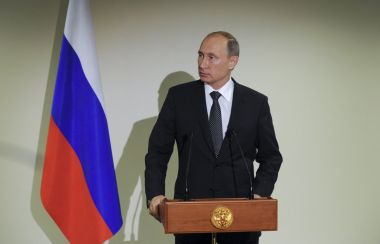Powers struggle to agree on Syria policy as Russia is challenged to strike terror groups

France challenged Russia to back its words with deeds over fighting Islamic State militants in Syria as major powers on Tuesday struggled to resolve differences between Moscow and the West over ending the civil war in the Middle Eastern country.
After Russian President Vladimir Putin, who has sent warplanes and tanks to support Syrian President Bashar al-Assad, called for a new anti-Islamic State coalition, diplomats pursued new ways to build a solid front against the militants.
Ideas suggested on the sidelines of the annual United Nations General Assembly in New York included using the model of a small group of world powers that succeeded in negotiating the July 14 Iran nuclear deal, and breathing new life into a virtually moribund broader UN peace mechanism.
"What's important in the fight against Islamic State is not the media strike, it's the real strike," French Foreign Minister Laurent Fabius said in response Putin's statements Monday at the gathering of world leaders.
Fabius said the Russians "talk a lot, but as far as I can tell they haven't committed any planes against Islamic State". He added: "If it (Russia) is against the terrorists, it's not abnormal to launch strikes against them."
A US-led coalition has been bombing Islamic State targets in Syria for about a year with a separate coalition with some of the same countries striking the militants in neighbouring Iraq.
The militants control large areas in both countries, exploiting chaos created in Syria by a civil war that began more than four years ago when Assad cracked down on protests against his government.
Putin's plans
Western officials have questioned whether Russian objectives in Syria are more to strengthen Assad and build up Moscow's presence as a power in the region than to fight the militants.
Putin told the General Assembly that Assad should be part of the coalition fighting Islamic State. Washington and its allies have indicated Assad might stay in power in the short term but a transition was essential and he had no long term role.
"Bashar has been qualified by the UN as a criminal against humanity. How can you imagine Syrians coming back if we tell them that their future passes through Assad?" Fabius said.
After Putin and US President Barack Obama met on Monday, both powers said they were committed to destroying Islamic State and they agreed their militaries would communicate to avoid any accidental clashes between forces in the area.
"There was agreement that Syria should be a unified country, united, that it needs to be secular, that ISIL (Islamic State) needs to be taken on, and that there needs to be a managed transition," US Secretary of State John Kerry said on Tuesday.
Kerry told MSNBC: "Everybody understands that Syria is at stake, and the world is looking rapidly for some kind of resolution."
Assad's future
Assad's future role remained the biggest sticking point and Kerry told MSNBC differences remained on what the outcome of such a transition would be. He said he would have further talks with Russian Foreign Minister Sergei Lavrov here on Wednesday.
Obama told a UN meeting on Tuesday: "Defeating ISIL requires, I believe, a new leader and an inclusive (Syrian) government that unites the Syrian people in the fight against terrorist groups. This is going to be a complex process."
EU foreign policy chief Federica Mogherini said foreign ministers from Russia, China, Britain, France, Germany and the United States, who met for dinner on Monday, had considered the idea of using the model of that P5+1 group to address Syria.
She said in another meeting of the 28 European Union foreign minister members explored that and other options, including using the EU's influenbce in the region. "I guess we will have to do a little bit of shuttle diplomacy," she told reporters.
Russia's Lavrov said he hoped a meeting of the UN Security Council on counter terrorism on Wednesday would be another chance to build a solid international legal basis for whatever action might be necessary to fight Islamic State.
Russia is president of the 15-member Security Council for September and Lavrov would chair the meeting.
Western council diplomats, however, voiced doubts that the meeting would yield any significant results.
A bid by Russia for a unanimous council statement on counter terrorism failed after Washington refused to negotiate on the text, which diplomats said strayed into divisive political issues such Syria and Yemen and the Middle East peace process.
In his speech to the General Assembly on Monday Putin proposed talks on a possible Security Council resolution "aimed at coordinating the actions of all forces that confront Islamic State".











